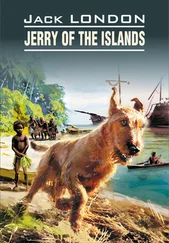Jack London - Jerry of the Islands
Здесь есть возможность читать онлайн «Jack London - Jerry of the Islands» весь текст электронной книги совершенно бесплатно (целиком полную версию без сокращений). В некоторых случаях можно слушать аудио, скачать через торрент в формате fb2 и присутствует краткое содержание. Жанр: Классическая проза, Морские приключения, на английском языке. Описание произведения, (предисловие) а так же отзывы посетителей доступны на портале библиотеки ЛибКат.
- Название:Jerry of the Islands
- Автор:
- Жанр:
- Год:неизвестен
- ISBN:нет данных
- Рейтинг книги:4 / 5. Голосов: 1
-
Избранное:Добавить в избранное
- Отзывы:
-
Ваша оценка:
- 80
- 1
- 2
- 3
- 4
- 5
Jerry of the Islands: краткое содержание, описание и аннотация
Предлагаем к чтению аннотацию, описание, краткое содержание или предисловие (зависит от того, что написал сам автор книги «Jerry of the Islands»). Если вы не нашли необходимую информацию о книге — напишите в комментариях, мы постараемся отыскать её.
Jerry of the Islands — читать онлайн бесплатно полную книгу (весь текст) целиком
Ниже представлен текст книги, разбитый по страницам. Система сохранения места последней прочитанной страницы, позволяет с удобством читать онлайн бесплатно книгу «Jerry of the Islands», без необходимости каждый раз заново искать на чём Вы остановились. Поставьте закладку, и сможете в любой момент перейти на страницу, на которой закончили чтение.
Интервал:
Закладка:
Royal he was, by nature, by training, by deed. He carried himself with consciousness of royalty. He looked royal—as a magnificent stallion may look royal, as a lion on a painted tawny desert may look royal. He was as splendid a brute—an adumbration of the splendid human conquerors and rulers, higher on the ladder of evolution, who have appeared in other times and places. His pose of body, of chest, of shoulders, of head, was royal. Royal was the heavy-lidded, lazy, insolent way he looked out of his eyes.
Royal in courage was he, this moment on the Arangi , despite the fact that he knew he walked on dynamite. As he had long since bitterly learned, any white man was as much dynamite as was the mysterious death-dealing missile he sometimes employed. When a stripling, he had made one of the canoe force that attacked the sandalwood-cutter that had been even smaller than the Arangi . He had never forgotten that mystery. Two of the three white men he had seen slain and their heads removed on deck. The third, still fighting, had but the minute before fled below. Then the cutter, along with all her wealth of hoop-iron, tobacco, knives and calico, had gone up into the air and fallen back into the sea in scattered and fragmented nothingness. It had been dynamite—the MYSTERY. And he, who had been hurled uninjured through the air by a miracle of fortune, had divined that white men in themselves were truly dynamite, compounded of the same mystery as the substance with which they shot the swift-darting schools of mullet, or blow up, in extremity, themselves and the ships on which they voyaged the sea from far places. And yet on this unstable and death-terrific substance of which he was well aware Van Horn was composed, he trod heavily with his personality, daring, to the verge of detonation, to impact it with his insolence.
“My word,” he began, “what name you make ’m boy belong me stop along you too much?” Which was a true and correct charge that the boys which Van Horn had just returned had been away three years and a half instead of three years.
“You talk that fella talk I get cross too much along you,” Van Horn bristled back, and then added, diplomatically, dipping into a half-case of tobacco sawed across and proffering a handful of stick tobacco: “Much better you smoke ’m up and talk ’m good fella talk.”
But Nau-hau grandly waved aside the gift for which he hungered.
“Plenty tobacco stop along me,” he lied. “What name one fella boy go way no come back?” he demanded.
Van Horn pulled the long slender account book out of the twist of his loin-cloth, and, while he skimmed its pages, impressed Nau-hau with the dynamite of the white man’s superior powers which enabled him to remember correctly inside the scrawled sheets of a book instead of inside his head.
“Sati,” Van Horn read, his finger marking the place, his eyes alternating watchfully between the writing and the black chief before him, while the black chief himself speculated and studied the chance of getting behind him and, with the single knife-thrust he knew so well, of severing the other’s spinal cord at the base of the neck.
“Sati,” Van Horn read. “Last monsoon begin about this time, him fella Sati get ’m sick belly belong him too much; bime by him fella Sati finish altogether,” he translated into bêche-de-mer the written information: DiedofdysenteryJuly4th , 1901.
“Plenty work him fella Sati, long time,” Nau-hau drove to the point. “What come along money belong him?”
Van Horn did mental arithmetic from the account.
“Altogether him make ’m six tens pounds and two fella pounds gold money,” was his translation of sixty-two pounds of wages. “I pay advance father belong him one ten pounds and five fella pounds. Him finish altogether four tens pounds and seven fella pounds.”
“What name stop four tens pounds and seven fella pounds?” Nau-hau demanded, his tongue, but not his brain, encompassing so prodigious a sum.
Van Horn held up his hand.
“Too much hurry you fella Nau-hau. Him fella Sati buy ’m slop chest along plantation two tens pounds and one fella pound. Belong Sati he finish altogether two tens pounds and six fella pounds.”
“What name stop two tens pounds and six fella pounds?” Nau-hau continued inflexibly.
“Stop ’m along me,” the captain answered curtly.
“Give ’m me two tens pounds and six fella pounds.”
“Give ’m you hell,” Van Horn refused, and in the blue of his eyes the black chief sensed the impression of the dynamite out of which white men seemed made, and felt his brain quicken to the vision of the bloody day he first encountered an explosion of dynamite and was hurled through the air.
“What name that old fella boy stop ’m along canoe?” Van Horn asked, pointing to an old man in a canoe alongside. “Him father belong Sati?”
“Him father belong Sati,” Nau-hau affirmed.
Van Horn motioned the old man in and on board, beckoned Borckman to take charge of the deck and of Nau-hau, and went below to get the money from his strong-box. When he returned, cavalierly ignoring the chief, he addressed himself to the old man.
“What name belong you?”
“Me fella Nino,” was the quavering response. “Him fella Sati belong along me.”
Van Horn glanced for verification to Nau-hau, who nodded affirmation in the reverse Solomon way; whereupon Van Horn counted twenty-six gold sovereigns into the hand of Sati’s father.
Immediately thereafter Nau-hau extended his hand and received the sum. Twenty gold pieces the chief retained for himself, returning to the old man the remaining six. It was no quarrel of Van Horn’s. He had fulfilled his duty and paid properly. The tyranny of a chief over a subject was none of his business.
Both masters, white and black, were fairly contented with themselves. Van Horn had paid the money where it was due; Nau-hau, by virtue of kingship, had robbed Sati’s father of Sati’s labour before Van Horn’s eyes. But Nau-hau was not above strutting. He declined a proffered present of tobacco, bought a case of stick tobacco from Van Horn, paying him five pounds for it, and insisted on having it sawed open so that he could fill his pipe.
“Plenty good boy stop along Langa-Langa?” Van Horn, unperturbed, politely queried, in order to make conversation and advertise nonchalance.
The King o’ Babylon grinned, but did not deign to reply.
“Maybe I go ashore and walk about?” Van Horn challenged with tentative emphasis.
“Maybe too much trouble along you,” Nau-hau challenged back. “Maybe plenty bad fella boy kai-kai along you.”
Although Van Horn did not know it, at this challenge he experienced the hair-pricking sensations in his scalp that Jerry experienced when he bristled his back.
“Hey, Borckman,” he called. “Man the whaleboat.”
When the whaleboat was alongside, he descended into it first, superiorly, then invited Nau-hau to accompany him.
“My word, King o’ Babylon,” he muttered in the chief’s ears as the boat’s crew bent to the oars, “one fella boy make ’m trouble, I shoot ’m hell outa you first thing. Next thing I shoot ’m hell outa Langa-Langa. All the time you me fella walk about, you walk about along me. You no like walk about along me, you finish close up altogether.”
And ashore, a white man alone, attended by an Irish terrier puppy with a heart flooded with love and by a black king resentfully respectful of the dynamite of the white man, Van Horn went, swashbuckling barelegged through a stronghold of three thousand souls, while his white mate, addicted to schnapps, held the deck of the tiny craft at anchor off shore, and while his black boat’s crew, oars in hands, held the whaleboat stern-on to the beach to receive the expected flying leap of the man they served but did not love, and whose head they would eagerly take any time were it not for fear of him.
Читать дальшеИнтервал:
Закладка:
Похожие книги на «Jerry of the Islands»
Представляем Вашему вниманию похожие книги на «Jerry of the Islands» списком для выбора. Мы отобрали схожую по названию и смыслу литературу в надежде предоставить читателям больше вариантов отыскать новые, интересные, ещё непрочитанные произведения.
Обсуждение, отзывы о книге «Jerry of the Islands» и просто собственные мнения читателей. Оставьте ваши комментарии, напишите, что Вы думаете о произведении, его смысле или главных героях. Укажите что конкретно понравилось, а что нет, и почему Вы так считаете.








